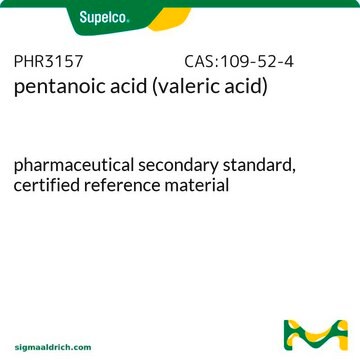240370
Valeric acid
≥99%
Synonym(s):
n-Valeric acid, Pentanoic acid
About This Item
Recommended Products
vapor density
3.5 (vs air)
Quality Level
vapor pressure
0.15 mmHg ( 20 °C)
Assay
≥99%
form
liquid
autoignition temp.
707 °F
expl. lim.
7.6 %
refractive index
n20/D 1.408 (lit.)
bp
110-111 °C/10 mmHg (lit.)
185 °C (lit.)
mp
−20-−18 °C (lit.)
density
0.939 g/mL at 25 °C (lit.)
functional group
carboxylic acid
SMILES string
CCCCC(O)=O
InChI
1S/C5H10O2/c1-2-3-4-5(6)7/h2-4H2,1H3,(H,6,7)
InChI key
NQPDZGIKBAWPEJ-UHFFFAOYSA-N
Looking for similar products? Visit Product Comparison Guide
Related Categories
General description
Application
Signal Word
Danger
Hazard Statements
Precautionary Statements
Hazard Classifications
Aquatic Chronic 3 - Eye Dam. 1 - Skin Corr. 1B
Storage Class Code
8A - Combustible corrosive hazardous materials
WGK
WGK 1
Flash Point(F)
192.2 °F - closed cup
Flash Point(C)
89 °C - closed cup
Personal Protective Equipment
Choose from one of the most recent versions:
Certificates of Analysis (COA)
Don't see the Right Version?
If you require a particular version, you can look up a specific certificate by the Lot or Batch number.
Already Own This Product?
Find documentation for the products that you have recently purchased in the Document Library.
Customers Also Viewed
Our team of scientists has experience in all areas of research including Life Science, Material Science, Chemical Synthesis, Chromatography, Analytical and many others.
Contact Technical Service










